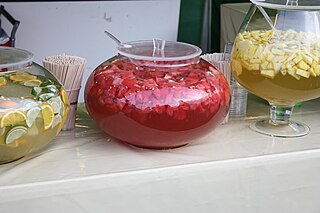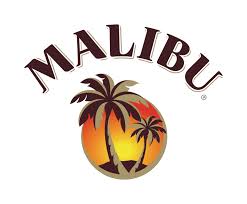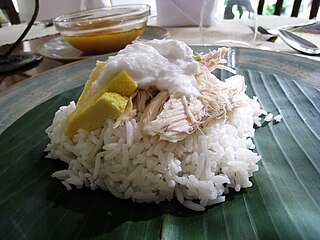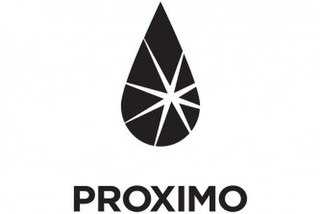
Rum and Coke, or the Cuba libre, is a highball cocktail consisting of cola, rum, and in many recipes lime juice on ice. Traditionally, the cola ingredient is Coca-Cola ("Coke") and the alcohol is a light rum such as Bacardi. However, the drink may be made with various types of rums and cola brands, and lime juice may or may not be included.

Costa Rican cuisine is known for being fairly mild, with high reliance on fruits and vegetables. Rice and black beans are a staple of most traditional Costa Rican meals, often served three times a day. Costa Rican fare is nutritionally well rounded, and nearly always cooked from scratch from fresh ingredients. Owing to the location of the country, tropical fruits and vegetables are readily available and included in the local cuisine.

Puerto Rican cuisine has its roots in the cooking traditions and practices of Europe, Africa and the native Taínos. Since the latter part of the 19th century, Puerto Rican cuisine can be found in several other countries.

The term punch refers to a wide assortment of drinks, both non-alcoholic and alcoholic, generally containing fruits or fruit juice. The drink was introduced from India to England by employees of the English East India Company. Punch is usually served at parties in large, wide bowls, known as punch bowls.

Cuban cuisine is a blend of African, Spanish, and other Caribbean cuisines. Some Cuban recipes share spices and techniques with Spanish and African cooking, with some Caribbean influence in spice and flavor. This results in a blend of the several different cultural influences. A small but noteworthy Chinese influence can also be accounted for, mainly in the Havana area. There is also some Italian influence. During colonial times, Cuba was an important port for trade, and many Spaniards who lived there brought their culinary traditions with them.
Jamaican cuisine includes a mixture of cooking techniques, flavours and spices influenced by Amerindian, African, Irish, English, French, Portuguese, Spanish, Indian, Chinese and Middle Eastern people who have inhabited the island. It is also influenced by the crops introduced into the island from tropical Southeast Asia. All of which are now grown locally in Jamaica. A wide variety of seafood, tropical fruits and meats are available.

Captain Morgan is a brand of flavored rums produced by British alcohol conglomerate Diageo. It is named after the 17th-century Welsh privateer of the Caribbean, Sir Henry Morgan. Since 2017, the label has used the slogan "Live like the Captain".

The arrival of several waves of Hispanic, and other Caribbean, immigrants to Florida since the late 1800s has played an important role in the development of Floribbean cuisine. The use of seafood, as well as of Asian and Caribbean ingredients and cooking methods have made Floribbean cookery generally healthier than meat- and fat-heavy cuisines.

Malibu is a coconut flavored liqueur, made with Caribbean rum, and possessing an alcohol content by volume of 21.0 %. As of 2017 the Malibu brand is owned by Pernod Ricard, who calls it a "flavored rum", where this designation is allowed by local laws.

Coquito meaning "Little Coconut" in Spanish is a traditional Christmas drink that originated in Puerto Rico. The coconut-based alcoholic beverage is similar to eggnog, sometimes being called the Puerto Rican Eggnog. The mixed drink is made with Puerto Rican rum, coconut milk, cream of coconut, sweetened condensed milk, vanilla, nutmeg, clove, and cinnamon.

Don Q is a Puerto Rican rum, distilled, manufactured, bottled, and distributed by Destilería Serrallés from its corporate facility in Ponce, Puerto Rico. Don Q, "Puerto Rico's best-known rum", is the top-selling rum in Puerto Rico, where over 70% of the rum consumed in the United States is produced. The rum derives its name from Don Quixote, the protagonist in Miguel de Cervantes' classic Spanish novel. The rum is sold internationally, competing against Bacardi for market share. Available in the United States since June 2009, Don Q continues to outsell Bacardi in Puerto Rico.
Dominican cuisine is made up of Spanish, indigenous Taíno, Middle-Eastern and African influences. Many Middle-Eastern dishes have been adopted into Dominican cuisine, such as the "Quipe" that comes from the Lebanese kibbeh.

Haitian cuisine consists of cooking traditions and practices from Haiti. It is a Creole cuisine, that originates from a blend of several culinary styles that populated the western portion of the island of Hispaniola, namely the African, French, indigenous Taíno, Spanish and Arab influence. Haitian cuisine is comparable to that of "criollo" cooking and similar to the rest of the Latin Caribbean, but differs in several ways from its regional counterparts.

Coconut rice is a dish prepared by soaking white rice in coconut milk or cooking it with coconut flakes. As both the coconut and the rice-plant are commonly found in the tropics all-around the world, coconut rice too is found in many cultures throughout the world, spanning across the equator from the Indian subcontinent, Southeast Asia, South America, Central America, East Africa, West Africa, the Caribbean and Oceania.

Rum is a liquor made by fermenting then distilling sugarcane molasses or sugarcane juice. The distillate, a clear liquid, is usually aged in oak barrels. Most rums are produced in Caribbean and North and South American countries, but also in other sugar-producing countries, such as the Philippines, and Taiwan.
Dominica cuisine is the cuisine of the island nation of Dominica. The cuisine is rooted in creole techniques with local produce flavored by spices found on the island.
Indo-Martiniquais are an ethnic group of Martinique, compromising approximately 10% of the population of the island. The Indo-Martiniquais are descendants of indentured labourers of the nineteenth century from India of primarily Tamil and of other Indian origin. They are primarily most concentrated in the northern communes of Martinique, where the main plantations are located. The Indo-Martiniquais speak Antillean a French-based creole.

Kraken Black Spiced Rum is a Caribbean black spiced rum. It is distributed in the United States by Proximo Spirits, and named after the kraken, a mythical giant squid-like sea monster. However, the bottle has a rendering of the actual giant squid with a reference to its scientific name, Architeuthis Dux.

Proximo Spirits, Inc., is an American spirits importer and international distributor based in Jersey City, New Jersey. It is best known for importing and distributing Jose Cuervo, the world's largest-selling tequila brand.














